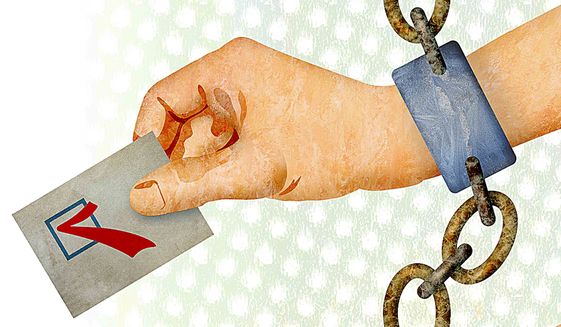![mandatory voting illustration 3_222015_b3-knig-mandatory-v8201_c0-0-2933-1710_s561x327]() Washington Times, April 2, 2015
Washington Times, April 2, 2015
The mandatory voting panacea
Obama would deploy coercion in the voting booth
President Obama recently suggested that mandatory voting could cure some of the ills of American democracy. Mr. Obama observed that compelling everyone to vote is one way to “encourage more participation” — perhaps the same way that the specter of prison sentences encourages more people to pay taxes. While there are many good reasons to oppose mandatory voting, compulsory balloting could help Americans recognize what their political system has become.
Mr. Obama declared that “the people who tend not to vote” are “skewed more heavily toward immigrant groups and minority groups … and there’s a reason why some folks try to keep them away from the polls.” If minorities vote at a lower percentile rate, that is sufficient justification for destroying everyone’s freedom in the name of equality. The fact that blacks had a higher turnout rate than whites in the 2012 presidential election is not permitted to interrupt the progressive victimization narrative.
Mr. Obama declared, “It would be transformative if everybody voted” and it “would counteract [campaign] money more than anything.” The president also said that politicians raising heaps of money “just degrades our democracy generally.” For Mr. Obama, political fundraising is degrading — but mass coercion is not.
Mandatory voting would entitle politicians to punish citizens who refuse to vote for politicians. Many citizens boycott polling booths because they consider politicians the nation’s pre-eminent pathological liars. But mandatory voting laws would prohibit any “conscientious objection” to forced endorsement of one of the rascals who got his name on the ballot.
Most surveys show that nonvoters are less well-informed than voters. Politicians have long been accustomed to prey on ignorant voters, and it would require only a minor rhetorical tweak to appeal to complete know-nothings. As long as the final count is tens of millions of votes higher, politicians and their media lackeys will proclaim victory for a new, more inclusive democracy.
Politicians have long boasted that their power is legitimate because it was conferred by the consent of voters. Making voting mandatory would obliterate any illusion of “consent” but few people would notice the change. Only 19 percent of Americans said the federal government has “the consent of the governed,” according to a 2014 Rasmussen Reports poll. Polls show that not since 1964 have a majority of Americans favored increasing the size and power of the federal government. But politicians have perennially scorned voters’ preference and continually enlarged the arsenal of penalties and prohibitions bureaucrats deploy against private citizens. Presidents and congressmen prattle about how their actions embody the “will of the people” — even though no citizen asked to be fettered with an $18 trillion national debt.
Politicians could not even suggest making voting mandatory unless vast numbers of Americans had become politically illiterate. Ever since Woodrow Wilson, presidents have conflated voting and freedom — as if they were two sides of the same coin. Democratic Sen. Dianne Feinstein of California, in a speech on Mr. Obama’s first Inauguration Day, proclaimed, “The freedom of the people to choose its leaders is the root of liberty.” And as long as the government obliges people to register a preference for the commander in chief, then people are free — no matter how much power the president subsequently seizes.
Popular perceptions of the purpose of elections have profoundly changed over the past 200 years. The Founding Fathers viewed elections as one of the most important leashes that citizens could attach to politicians. Law professor John Phillip Reid, author of “The Concept of Representation in the Age of the American Revolution,” observed, “Eighteenth-century representation was primarily an institution of restraint on governmental power.” Early American voters expected congressmen to protect them from the ravages of the executive branch. But any such hope of constraining government via ballots seems like a relic of the horse-and-buggy era. Instead, voting is becoming more like a medieval act of fealty — with citizens obliged to promise unlimited obedience to whoever is proclaimed the winner.
Since the government now claims a right to punish citizens for almost everything, perhaps it is only appropriate to add nonvoting to the roster of official crimes. Making voting compulsory could codify the true relation between politicians and citizens.
Any new voting process should be designed to be both transparent and uplifting. Instead of simply sending violators a ticket a few weeks after an election, political candidates could walk the streets on election eve and use Tasers on anyone who could not prove they voted. As long as the punishments are labeled “freedom shocks,” no decent citizen would have a right to object. But it would be important to set the voltage level low enough to avoid fatalities that could be exploited by cynics and civil liberties extremists.
Nowadays, we have elections in lieu of freedom. For a long time, national elections have offered little more than two parties taking turns trampling rights and plundering the Treasury. Regardless, no law should be passed to compel voting until after we discover a method to compel politicians to be honest.
• James Bovard is the author of “Attention Deficit Democracy” (Palgrave, 2006) and “Lost Rights” (St. Martin’s, 1994).
* Excellent art work by Greg Groesch
The post Wash. Times: The Mandatory Voting Panacea appeared first on James Bovard.
